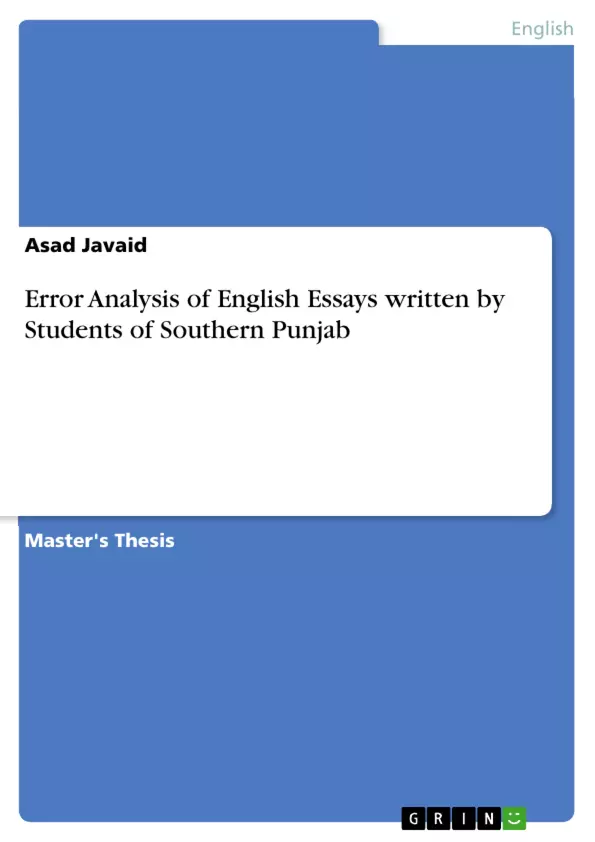It is a descriptive study based on the analysis of essays written by male and female students in two different schools of Multan, Southern Punjab. In the present research, the researcher has collected data from two different schools i.e. one government and one private. The participants for the present research are the students (boys and girls) of secondary level. The data for the present research has been collected from hundred students in the form of essays on My Favourite Personality and My Autobiography. The researcher has employed Pit Corder’s (1967) model for the analysis of data. The data has been analysed, and the researcher has categorized errors committed by the students into different types i.e. verb tense, subject verb disagreement, inappropriate use of article, wrong use of preposition etc. The data is also represented in the form of pie-chart. Furthermore, the frequency of occurrence of different types of errors is also discussed along with some of the possible causes of errors. The findings of the present research highlight that students of government school commit more errors than that of private. Moreover, the findings also suggest that students commit errors not only due to their mother tongue influence, but because of other reasons which are explained in the analysis section. These findings are valuable for academia to devise policies accordingly.
Table of Contents
- I INTRODUCTION
- 1.1 Statement of the Problem
- 1.2 Significance of the Study
- 1.3 Delimitations
- 1.4 Contrastive Analysis
- 1.5 Objective (s) of the Study
- 1.6 Research Methodology
- 1.7 Research Questions
- 1.8 Chapter Summaries and Divisions
- II LITERATURE REVIEW
- 2.1 Target Language
- 2.2 Language Interference
- 2.3 Second Language Acquisition
- 2.4 Similar Research Works
- 2.5 Errors in Language
- 2.6 Theoretical Framework
- 2.7 Key Terms
- 2.7.1 Mistake
- 2.7.2 Error
- 2.7.3 Error Analysis
- 2.7.4 Narrative Essay
- 2.7.5 Descriptive Essay
- 2.8 The Acquisition of Articles and Determiners: Some Basis Hypotheses
- 2.8.1 Feature-Based Discourse Models
- 2.8.2 Functional Morphology: Data Errors and Analysis
- 2.9 Articles: Literature Review and Theoretical Understanding
- 2.9.1 Article-Based Theory: 1. Discourse Rule Transfer (DRT)
- 2.9.2 Article- The Second Theory: ARC and the Fluctuation Hypothesis
- III RESEARCH METHODOLOGY
- 3.1 Research Design of the Present Study
- 3.2 Research Questions
- 3.3 Data Collection Procedure
- 3.4 Data Analysis
- 3.5 Ethical Considerations
- IV DATA ANALYSIS
- 4.1 Verb Tense
- 4.2 Word Order
- 4.3 Subject-Verb Agreement
- 4.4 Capitalization
- 4.5 Spelling
- 4.6 Articles
- 4.7 Prepositions
- 4.8 Sentence Fragment
- 4.9 Double Negative
- 4.10 Pronouns
Objectives and Key Themes
This thesis investigates the common errors made by students in Southern Punjab when writing English essays. The study aims to identify the types of errors, their frequency, and possible causes. The research will use data from essays written by male and female students from both government and private schools in Multan.
- Error analysis of English essays written by students in Southern Punjab
- Comparison of error frequency between students from government and private schools
- Identification of potential causes of errors, including mother tongue influence and other factors
- Contribution to the understanding of language acquisition and error analysis in the context of English as a second language
- Development of pedagogical implications and recommendations for improving English language instruction in the region
Chapter Summaries
The first chapter provides an introduction to the research problem, its significance, delimitations, and research objectives. It outlines the contrastive analysis framework and the methodology used to collect and analyze data. Chapter two delves into the existing literature on the topic, exploring themes related to target language, language interference, second language acquisition, similar research works, errors in language, theoretical frameworks, and key terms like mistake, error, error analysis, narrative essay, and descriptive essay. The chapter also examines the acquisition of articles and determiners, reviewing various theoretical models. The third chapter outlines the research methodology, discussing the research design, data collection procedures, analysis methods, and ethical considerations. The fourth chapter presents the detailed analysis of errors found in the collected essays, focusing on specific error categories such as verb tense, word order, subject-verb agreement, capitalization, spelling, articles, prepositions, sentence fragments, double negatives, and pronouns. The analysis delves into the frequency of each error type and potential causes.
Keywords
Error Analysis, English as a Second Language, Second Language Acquisition, Language Interference, Contrastive Analysis, Essay Writing, Error Types, Pedagogical Implications, Southern Punjab, Pakistan.
- Quote paper
- Asad Javaid (Author), 2017, Error Analysis of English Essays written by Students of Southern Punjab, Munich, GRIN Verlag, https://www.grin.com/document/425071



